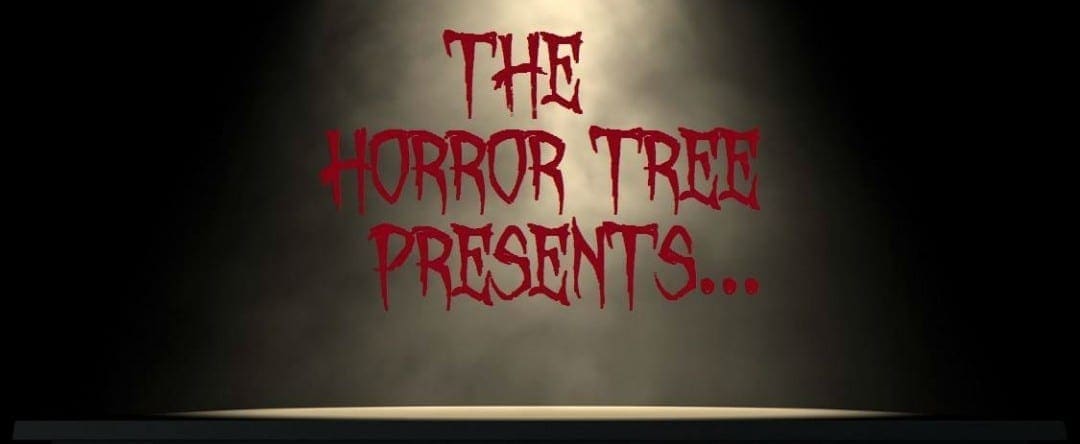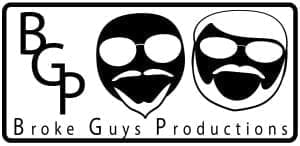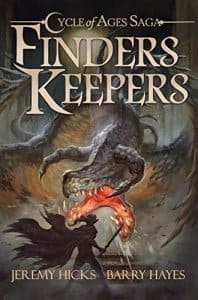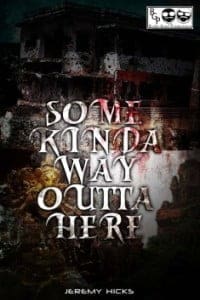The Horror Tree Presents…An Interview with Jeremy Hicks

Lucien – On your website you have quite the sense of humor, introducing yourself as a demon possessing the body of the man formerly known as Jeremy Hicks. Where does that come from and does it play a part in your writing?
Jeremy – Death touched my life early and often, as a result I developed a dark, acerbic sense of humor to cope with the tragedies that kept happening to those around me, and the lingering results from nearly losing my own life at birth. I think it also branded me with an insatiable curiosity for learning, exploring, and asking the types of difficult questions parents, grandparents, and religious and authority figures never want to field. So, I searched for my own answers in books, which only led to more questions.
Growing up the Deep South, however, it’s never a good idea to be a curious bookworm who bucks the old timey hateful rhetoric that passes for religion for too many here. Being open to an evolving worldview rather than embracing the standard dogma condemned me to Hell at a young age for them…and quite a number of them let me know it, quite vocally and quite often. I still hear it today. I’ve even earned a death threat or two thanks to my opinions on politics, religion, and economics.
This vocal minority seemed to paint me as a member of the legion of “demons” seeking to remove humanity from the shadows of the Dark Ages, a sad phenomenon that seems to have never ended, just moved to the New World to simmer behind the national culture until the digital age gave it an ironic rebirth. Like any good defensive mechanism, my sense of humor twists it into something else to lampoon about already laughable people.
Lucien – You also mention that you’re an archaeologist. How does one go from that field to being an author of dark fantasy and horror? Do you still do field work as an archaeologist?
Jeremy – I always wanted to write professionally, even before my first stories were published in school newspapers and literary magazines, but it did not feel like a realistic pursuit for a poor county boy. Most days it still doesn’t. Honestly, pain, suffering, and the need to pursue less hazardous occupation full-time influenced my decision to approach my friends with the idea to form a company to peddle our different story ideas. I was tired of profit-hungry bosses putting others and me into dangerous situations that could have been avoided. My own experience in corporate archaeology, or cultural resource management, resulted in injuries severe enough to require two back surgeries and extensive physical therapy. As a result, my most recent field excavation was in 2014.
Lucien – What is it about the dark fantasy/horror genre that draws you to it? What do you think draws your readers to it?
Jeremy – At its core, I think the horror genre, including dark fantasy, is about the chills and thrills. They trigger primal biochemical responses in our brain best experienced through the safe lens of fiction. Also, these stories tend to appeal to our more cynical opinions about humanity. Main characters are not usually knights in shining armor, in any sense of the term. They may be drunk and horny teenagers, tarnished anti-heroes, principled villains, or literally monsters.
As a writer, horror and dark fantasy allow us to explore these nastier sorts of characters without having to provide a redeemable lead or reliable narrator. Often, this will allow the plotter to construct a morbid morality tale, biting social commentary, or a disguised metaphor that allows a deeper story to be told using the common tropes we find in this genre.
As a reader, I am drawn to stories that can speak to the fears, worries, and anxieties that lurk in the light of day, only to emerge when one crawls under the covers in a pitch black room for a restful night’s sleep. Thankfully, the broad spectrum of these negative thoughts is a goldmine for a writer seeking to scare their audience. This provides an equally broad spectrum of horror stories, each appealing to a different niche. Fortunately, avid fans of horror tend to search for darker, more disturbing experiences that bring on their particular fear-filled adrenaline rush. I know I do. That’s makes our job of connecting with our readers that much easier.
 Lucien – Can you talk a little bit about Broke Guy Productions and how that came together?
Lucien – Can you talk a little bit about Broke Guy Productions and how that came together?
Jeremy – Originally, our creative projects were slated to be a social enterprise created among a group of friends. When it came time to dedicating the time and resources necessary to make our company a reality, Barry Hayes and I were the only ones to take the extra steps necessary to establish a licensed business, complete projects, and query agents, managers, producers, and publishers. We started with feature-length screenplay projects; the novelization of one of those, Cycle of Ages Saga: Finders Keepers, attracted a publisher before hooking any production companies.
 Lucien – Where do you find your general inspiration for your work? Do you have any specific influences or authors you look up to?
Lucien – Where do you find your general inspiration for your work? Do you have any specific influences or authors you look up to?
Jeremy – Inspiration comes from the oddest places, but other media helps, especially music. Like most writers, my Imagination Station works best with fuel for the creative fire. I’ll give you a example of how it works for me.
My first Steampunk story, contracted for Capes & Clockwork from Dark Oak Press, evolved from a Beatles song. The lyrics from Yellow Submarine triggered a bit of wordplay in my mind. My brain kept singing, “We all live on a dwarven submarine!” Thus, “Deep Diving Death Defying Dwarves of the Deep” was born. That story turned out to be so influential that it became the prequel for a major plot arc and setting introduced in the third Cycle of Ages Saga novel, Delve Deep.
Lucien – What advice would you give to new authors looking to write in the dark fantasy/horror genres?
Jeremy – Realize that the fantasy market is oversaturated and the horror market is shrinking. The repeated successes from major fantasy franchises have flooded the market with new writers looking to make their mark on the world of fiction. Conservatively speaking, there are hundreds of thousands of fantasy titles on Amazon, not including romance and erotica authors using “fantasy” as a keyword for their books.
Sadly, less people read books every year; too many do not read them at all. Competing for fewer readers in an oversaturated market is not a good equation for success. On the plus side, dark fantasy, especially grim dark, is a growing market emerging inside the broader genre.
Lucien – Do you have a specific writing process?
Jeremy – I’m a plotter for the most part. I work better and finish more projects with an outline, even if I end up changing it a dozen times, which happens often. I used to write on a regular basis and shoot for specific word count goals while working; however, spending too much time sitting or typing or staring at a screen triggers a number of health issues for me, from headaches and blurred vision to cramps and other muscle spasms. Those problems have curtailed my work over the past few years.
Lucien – For your main body of work, you write alongside your friend Barry Hayes. How does your process change writing alone verses when you are working with Barry?
Jeremy – Our writing process changed dramatically from screenplays to novels. Screenplays are mostly dialogue, so they flow better for me when I have partners, especially someone as entertaining as Barry, with whom to spitball ideas, talk through dialogue, and catch potential story or character issues. For the novels, we plotted and planned together. As a result of scheduling and other issues, the bulk of the writing and editing fell on my shoulders. For the shared workload, we split chapters or scenes. We wrote those individually and sent them to the other to edit and proof. We worked back and forth like that until we had something polished enough to warrant sending our manuscript to a professional editor. I recommend that extra step before approaching any agent, manager, or publisher.
Lucien – Let’s talk about the Cycle of Ages Saga. It started as a DnD-like game and moved into a novel. What was that journey like? Where do you think the future of the series lies?
Jeremy – During high school and college, Barry and I spent much of our time playing and running role-playing games for our friends. He started his games in Virginia, before moving to Alabama where he continued a storyline that formed much of what we adapted in the main plot thread for our saga. Finders Keepers and Kaladimus Dor, the disastrous Mage of Myth, were created from Barry’s wacky sense of humor, while I played two different characters that were meshed into Yax’Kaqix (Blue Macaw), a former monk who prefers to work as a mercenary and adventurer. Some of the other characters and plot arcs involved in the storyline were inspired by in-game events, or at least events and plotlines intended to make it into games.
When we decided to debut our company with a fantasy franchise for its flagship property, we conspired to create the world of Faltyr to encompass these aspects and others, cobbled together from our individual campaigns. We filled this world with a sandbox big enough to handle anything our imaginations threw at it, but it focused on twisting and playing with many common horror and fantasy tropes. Faltyr grows with each story as it was built with layers upon layers, which I felt was a prerequisite for anything called the Cycle of Ages Saga.
As a result, I added detailed cultures, subcultures, a bestiary, coded climate zones, sketched out ocean currents and river systems, and fleshed out the pantheon(s) to take into account a post-apocalyptic world that had once been as connected as our own. For me, I enjoy the worldbuilding almost as much as telling a story, especially when it works out that the story serves to build the world in new, unexpected ways.
For now, the future of Faltyr is on hiatus as we wait for the fourth book, Nevermoor, to materialize. Depending on how it goes, we may need a fifth installment to develop the plot arcs completely.
 Lucien – When it comes to your other works, the one that caught my eye was Some Kinda Way Outta Here, where you combine Lovecraftian mythos with Vietnam culture. Where did that idea come from?
Lucien – When it comes to your other works, the one that caught my eye was Some Kinda Way Outta Here, where you combine Lovecraftian mythos with Vietnam culture. Where did that idea come from?
Jeremy – Once again, music provided the initial fuel for this particular creative conflagration. Some Kinda Way Outta Here was originally written as an entry for a Cthulhu Mythos anthology featuring The Summer of Love as its theme. The music of the 1960s, particularly the Jimi Hendrix song with the same title, mingled with countless movies and books about the Vietnam War consumed over the years. Bao Ninh’s The Sorrow of War influenced me, too. Unlike most books on the Vietnam War, this author’s haunting retrospective is a window into the conflict, and its lingering effects, from the viewpoint of a North Vietnamese soldier forced to fight to prevent meeting the same fate as his outspoken father.
I started by researching Vietnamese history and culture, particularly as it related to the repeated invasions of that region by foreigners, to find a good angle for my story. Eventually, I found that in a photo of a radio station in Qui Nhon City, Vietnam, attacked during the Tet Offensive. In the process, I decided to highlight how much American popular culture had invaded that nation before our troops ever set foot on the ground there. The result is one wild ride through the most traumatic events in the young life of our patriot protagonist, a member of the Viet Cong seeking to defend his homeland from outsiders, unaware that outsiders have lurked beneath his home for longer than humanity has existed.
Lucien – Lastly, with so many science fiction and fantasy series being turned into film and television franchises, would you ever look into revisiting the Cycle of Ages Saga screenplay and pitching it to be filmed?
Jeremy – I hope to do that later this year. My most recent pitch was to Amazon Studios, when they were seeking a property to rival Game of Thrones. They picked a ringer over a dark horse, though, opting for the upcoming The Lord of the Rings series.
Originally, we sought licensing for the Cycle of Ages Saga, and Faltyr, as an official Dungeons & Dragons property, but our agent at the time failed to pitch in a way that connected our saga’s deep roots with their franchise. I still have hopes that one day we will find an agent or producer who will make that connection for us, so we can help revitalize Dungeons & Dragons on the big screen. Thankfully, at this point, we have enough material to create an entire multimedia franchise, from books and games to movies and multiple television series…so time and effort (and a boatload of luck) will tell.
Lucien – You can learn more about Jeremy and his work via his website as well as on Facebook. Links to both are below along with where to purchase his novels.
Facebook: https://www.facebook.com/JeremyHicksAuthor/
Website: https://jjeremyhicks.com/
Cycle of Ages Series: https://cycleofagessaga.com/
https://www.facebook.com/CycleOfAgesSaga/
Amazon Links: https://www.amazon.com/dp/B01N53HD70/
https://www.amazon.com/Charity-Anthology-Horror-Science-Fiction-ebook/dp/B072LNGMBD
- About the Author
- Latest Posts
Lucien Welsh is a trans man from Canada who is constantly on the lookout for all things terrifying. When he isn’t down the rabbit hole of horror, Lucien write book reviews and works on his own fiction work. He has previously been published a few times as R.J. Richardson but has since retired that name. Currently Lucien is working on two projects: a middle-grade fantasy series and a dark-comedy thriller about a cop and his serial killer admirer.
Patreon: https://www.patreon.com/lucienwelsh
Wattpad: https://www.wattpad.com/user/LucienWelsh
Website: http://lucieninthestars.ca












